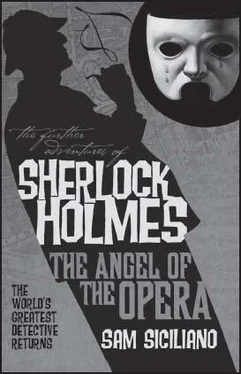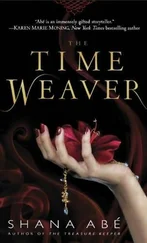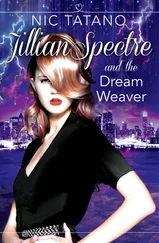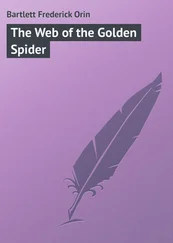Henry stepped up to the front door of Steerford’s house and rang the bell. He was magnificently dressed in his best black greatcoat and silk top hat. A diamond pin pierced his gray silk cravat, a loan from his cousin. As an old man with a miserly streak, Holmes appeared almost shabby—and virtually unrecognizable. He had colored his hair white, then added bushy white eyebrows and curly white sidewhiskers, which blossomed out from under the brim of his top hat. A huge white mustache somehow shrank his nose and hid his lips. He wore spectacles with thick lenses.
The door swung open, and an elderly man in formal attire opened the door, his watery eyes scrutinizing us. “Good day, sirs. Madam.”
“Mr. Robert Carlyle to see Mr. Steerford,” Henry said.
“He is expecting you, sir. Please come in.”
The butler gave our coats to the housekeeper then led us down the hallway to a cozy sitting room. The dark, elegant furniture and carpets were all new. Standing before the fire was a man in a black frock coat, his hands clasped behind him, his back to us.
“Ah, good... day.” As he turned, his voice skipped a beat, his eyes narrowing ever so slightly. His smile wavered, then recovered and became earnest. His hair was black, but his sidewhiskers were grayish, as were his mustache and goatee. He wore thick spectacles low on his nose, his eyes peering over the rims, and his hair was combed straight back and had an oily shine. His dress was impeccable: a double– breasted black frock coat with silken lapels (nearly identical to the one Henry wore), black waistcoat, and gray-and-black striped trousers, the glossy toes of his boots gleaming. As he extended his hand to shake Henry’s, I saw a pearl-and-gold cuff link.
“Robert Carlyle,” Henry said.
“A pleasure to meet you, Mr. Carlyle. And this charming lady must be your better half. I hope talk of financial matters will not bore you too much, Mrs. Carlyle.”
I managed a smile. “I shall do my best to keep awake.”
Steerford’s brow sank as he turned to Holmes. He had extremely bushy, black eyebrows, which extended across the bridge of his nose. “And who are you, sir?”
Holmes extended his hand. “I’m a Carlyle, too. James Carlyle, this lad’s father. Someone has to keep an eye on him. Can’t have him squandering the family fortune.” Holmes’ faintly querulous voice had the quaver of age and a slight Scottish burr.
“I am glad to meet you, Mr. Carlyle. Rest assured, we are not talking of squandering fortunes here, but of increasing them many times.”
“Easy words to say, Mr. Steerford.”
“Hopefully before you leave, you will be confident I offer more than mere words. To those select few my partners and I feel are worthy, we offer the financial opportunity of a lifetime.” Mr. Steerford’s voice flowed smoothly, almost like a caress, but its tone was pitched high for a man.
“Please sit down and warm yourselves by the fire. Mrs. Carlyle, I think you will find that chair most comfortable. Gentlemen, if you will take either end of the sofa, I shall soon show you certain documents and tangible evidence of our enterprise.”
We did as he suggested while he turned and walked over to a desk. He dimmed the lamp slightly then picked up a thick leather-bound book, which appeared to be a photograph album. He walked over to the fire and turned toward us. With the lamp low and his back to the fire, his face was in shadow.
“Gentlemen, could one of you tell me what the dominant fuel of our century has been, what fuel has made possible the great flowering of British industry and the rise of steam-powered machinery?”
Holmes cackled. “That’s easy enough. Coal.”
“Exactly so, Mr. Carlyle. Very astute.”
“Astute? Hardly. Any fool could figure that out.”
“You would be surprised, sir. Now, can either of you tell me what fuel is likely to dominate the coming century?”
Henry and Sherlock shared a glance. “Coal again,” Holmes said.
Steerford shook his head. “No, sir. Petroleum—oil.”
Holmes scowled. Henry said, “Do you think so?”
Steerford’s right arm swung out expansively. “Have you heard of Herr Benz’s horseless carriage, constructed in 1885? A humble start, but already Mr. Renault has begun constructing more advanced machines. He has refined the internal combustion engine, adding a second cylinder. These engines all use petrol, a distillate of petroleum, and one considerably lighter than kerosene. Kerosene has already captured a major portion of the lamp business. It burns better than coal or whale oil and can be produced more cheaply. Given the existing market for kerosene and the potential market for petrol as the internal combustion engine and the motorcar grow in use, we are confident the market for oil will dramatically increase in the twentieth century, eventually far surpassing that for coal.”
Holmes cackled again, an annoying sound. “What about the electric light, sir? What happens to your market for kerosene then?”
Steerford smiled and nodded patronizingly. “A very apt question, Mr. Carlyle. It is true that the electric light will someday replace light produced by gas or oil, but the process will be a lengthy and costly one. Electricity requires expensive generating and distribution facilities. Wires must be strung up everywhere and run into houses, which must then be retrofitted with further wiring. The growing petrol market for engines should more than compensate for the gradually declining market in kerosene. Does either of you gentlemen know the current source of most oil?”
“Another easy one,” Holmes said. “The United States of America.”
“Very good, sir!” He turned to Henry. “You are well served by having so knowledgeable an advisor. And has either of you heard of Mr. John Rockefeller?”
Holmes nodded. “Certainly.”
“Perhaps you could tell your son and his wife about Mr. Rockefeller.”
“He’s an American millionaire and the owner of Standard Oil.” Holmes had an avaricious glint in his eye. “He started with practically nothing in the seventies, and now he is one of the richest men in the world. He has a virtual monopoly on oil production in the States.”
“Quite so. Mr. Rockefeller is proof of the extraordinary opportunity which the oil business provides.” He let his right hand drop. His left hand still held the leather book. The fireplace seemed to be his stage, we the audience. “What I am about to reveal now must remain confidential. I must have your word on it.”
Henry had been stroking thoughtfully at his mustache, his gray leather gloves in his other hand. “You have my promise.”
“And mine,” I said.
Holmes cackled again. “I’ll not make any promises beforehand! What’s so blasted secret?”
Mr. Steerford squinted gravely at him through the thick lenses. “If not, I shall have to ask you to leave.”
Holmes’ smile turned to a scowl. “An outrage! I’ve never had to make such a promise in my life.”
Henry gave him a severe look. “Father, I think we should hear him out.”
I restrained a smile. “Yes, Father Carlyle.”
Holmes scratched fiercely at his nose. “Oh, I suppose so.”
“I have your word you will not say a word to another living soul?”
“You do, sir.” Holmes emphasized the “s” with a sibilant hiss.
Steerford nodded. “Excellent. You will not regret your promises. I have a brother slightly older than myself, a learned man, who studied chemistry and geology at Oxford. He spent some time in the United States working in the oil business. His education and his work there convinced him of the possibility that petroleum reserves might exist in Britain itself. If so, our country would no longer be dependent on American oil, and of course, such a discovery could lead to very great wealth indeed. Some five years ago my brother returned to England and commenced his quest. Two years ago we began some test drilling. The results have exceeded our wildest dreams. The first well began limited production a few months ago. We had a few investors provide capital for our initial foray. They have already quadrupled their money— quadrupled it .”
Читать дальше












